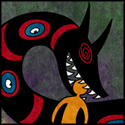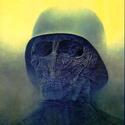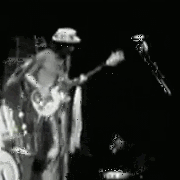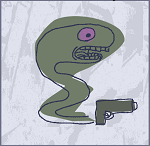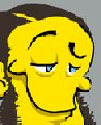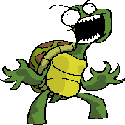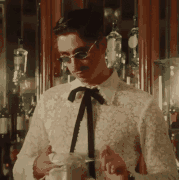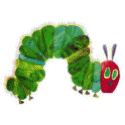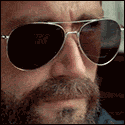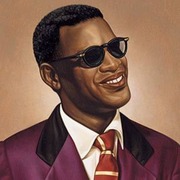|
I just finished The Big Sleep by Raymond Chandler. Classic hardboiled detective novel, nothing life-changing but a fun quick read. It's honestly hard to take that genre seriously when you read it in 2015, like even an excellent example of it (which this probably is) reads like a parody of itself. Still, there was plenty of intrigue and excitement. It was a nice change of pace from the heavy stuff I've been reading lately. Now I can watch the Humphrey Bogart movie!
|
|
|
|

|
| # ? May 31, 2024 01:20 |
|
Guava posted:I just finished The Big Sleep by Raymond Chandler. Classic hardboiled detective novel, nothing life-changing but a fun quick read. It's honestly hard to take that genre seriously when you read it in 2015, like even an excellent example of it (which this probably is) reads like a parody of itself. Still, there was plenty of intrigue and excitement. It was a nice change of pace from the heavy stuff I've been reading lately. This rear end in a top hat beat me to it by half a day. I have pretty much the same opinion of the book. The plot was fun and you can definitely see how many stories following this novel ripped it off wholesale. I loved the style; like Guava says, it reads like a parody of the genre because of how thoroughly it's been mined by this point, but the language is exceptionally good - it's not, like, hyper-eloquent like McCarthy or anything, but that wouldn't fit the tone of the book anyway so the evocative simplicity is enjoyable to read and supports the narrative. Honestly, the bits that put me off the most were the pervasive sexism and homophobia. Normally I guess I'd handwave it away with "those were the times," but it's hard to do that right after The Heart is a Lonely Hunter, an incredibly progressive novel that was published just a year after this one. Of course, it's also possible that the protagonist isn't supposed to be taken as a great moral authority (he covers up a murder to continue working his case and is pretty consistently described as unpleasant, both by other characters and in dialogue tags and such - "I grinned nastily," for example), but that's an iffy proposition when sexism and homophobia are prevalent even today and the 30's/40's certainly weren't better. Oh well, it was still quite enjoyable! But that definitely put a damper on it. Mahlertov Cocktail fucked around with this message at 07:41 on Nov 18, 2015 |
|
|
|
The Great Influenza by J Barry. An ambitious, thorough, and deeply flawed book about the 1918 influenza epidemic, its major players, and public health in America. In desperate need of judicious editing to pare the length down 30%. There's really two books here: the 1918 flu, and the history of the American medical / public health establishment, which are related (duh) through the flu epidemic. Despite these criticisms, I deeply enjoyed the book and found it comprehensive, well-researched, and engaging. I love public health and medical/scientific history and have wanted to read this forever.
|
|
|
|
Charles Leerhsen wanted to rectify the personal life of Ty Cobb (in Ty Cobb: A Terrible Beauty). For you non-Americans, he was a baseball player with a reputation as a murderer and truly miserable individual. He does clear up a lot of misconceptions, but is so apologetic for everything Cobb did as a player. Attacks a guy in the stands with few fingers on either hand? Really guys, they didn't make much of his pre-existing injuries in print then, so it's not like he was beating up the handicapped. Leerhsen also does not seem to understand the completely contradictory history of race relations in the south. He was nice to this black fellow once and he even was around black servants and children as a kid. There's no way that he did these mean things for racial reasons. Not that Cobb specifically picked on one race. He had a hair-trigger temper and was an egomaniac around everyone. Cobb wasn't a murderer and at least part of his life was fabricated in Al Stump's works (not to mention Cobb, the movie with Pete Ross in the lead role), but at the very least Ty Cobb was a tremendous dick and prima donna who used his status as an elite hitter to play by his own rules as a player. Strangely, Cobb's managerial career and post-baseball life are pretty even-handed in the book.
|
|
|
|
a
vrath fucked around with this message at 22:27 on Sep 22, 2018 |
|
|
|
Utz posted:I hope you won't think I've oversold it. Blood Meridian is the richer book for sure. But this is a really good book too, especially because of the language -- it really adds a depth and context to the story, and underscores the book's many ironies regarding Buccmaster's beliefs about his own culture. Just really interesting from many perspectives! I'm re-reading already because of the learning curve the language added, so now I can get more out of the first 20 pages or so. I'm interested to hear what others think, so please consider reading it. I just finished this last night. In my opinion it doesn't sit on a level with Blood Meridian, but it is a very good read once you get into the rhythm of the language. Even then some words aren't easy to decipher, or are undecipherable without the glossary. It took me until the last 50 pages to figure out that "ys" was "ice". I expected a brutal look at the Norman invasion and its aftermath; the few blurbs I'd read going into the book focused on the language and that aspect of the story. So I was quite surprised, but not unpleasantly so, with where the story went.
|
|
|
|
a
vrath fucked around with this message at 22:27 on Sep 22, 2018 |
|
|
|
Armada by Ernest Cline - I can see why people dislike it.
|
|
|
|
Exterminator!, by William S. Burroughs. My first Burroughs, but given his reputation I had a good idea of what to expect, and I was proven mostly right. Frenetic, jumbled, paranoid and gleefully profane. Apparently an "experimental novel", though it reads more like a collection of vaguely-connected short stories with a vague sense of progression. It was a very fun read, and full of surprises - a guide for efficient life habits, pornography that explodes the faces of FBI agents, police brutality at a student protest and gay youths transforming into wolves. Also a plot about an exterminator and heroin I think. I'm not sure, and I don't really mind. It was good. Period, by Dennis Cooper. The last George Miles Cycle book, the shortest, and the most detached. It's sad and wistful, and all the gore and grime built up over the last four books is thrown into harsh perspective: insignificant, naive, a facsimile of real power or real happiness. I couldn't immerse myself in this like I could Cooper's previous works, but I think that's kind of the point. He's spent four novels and ten years acclimatising his audience to a particular flavour of grotesque, drug-fuelled psychosexual depravity and violence, and now he's interrogating himself and his fans on what that really means. Babylon, by Victor Pelevin (aka Generation P). A satirical Russian novel about a guy who gets a job in advertising, and is slowly and inexorably sucked into the tangled mess of propaganda, money and manipulation at the heart of turn-of-the-Millennium Russian society. The book is a great portrait of post-Soviet Russia and the directionlessness of a society that only ten years before had been a Superpower. It's got a really satisfying cynical style that doesn't go overboard, and the frank pseudo-academic writing on advertising is absolutely wonderful. At one point early on, Tatarsky communes with a ouija board and a Rage Against The Machine LP to channel the spirit of Ché while high, all in order to get a better sense of how the ad business works. I'd have been satisfied if the book stayed along those lines, but things spiral into amazing hyperbole as Tatarsky gets closer and closer to the "truth" - or at least, one version of it. Definitely going to read more Pelevin after this.
|
|
|
|
Gertrude Perkins posted:Exterminator!, by William S. Burroughs. My first Burroughs, but given his reputation I had a good idea of what to expect, and I was proven mostly right. Frenetic, jumbled, paranoid and gleefully profane. Apparently an "experimental novel", though it reads more like a collection of vaguely-connected short stories with a vague sense of progression. It was a very fun read, and full of surprises - a guide for efficient life habits, pornography that explodes the faces of FBI agents, police brutality at a student protest and gay youths transforming into wolves. Also a plot about an exterminator and heroin I think. I'm not sure, and I don't really mind. It was good. This is one of my favourite of his, probably more so than Naked Lunch itself. The story of the man in a boat with a dog is one that I think of often. That he called it a novel is just sheer brass neck however.
|
|
|
|
vrath posted:Neuromancer by William Gibson You should now go and read the actual 1984 book if you have not yet so you can see the influence it had on books like neuromancer. Also brave new world. I just finished the Laundry Files by Stross. Love his mix of cthulhu and spy novel, I'd normally never read a spy novel or mystery but these somehow keep me hooked. Stross is a great pulp writer and awesome at keeping you engaged with the story and caring about the characters, even though you know they are Mary Sues. Washout fucked around with this message at 07:19 on Nov 29, 2015 |
|
|
|
Washout posted:You should now go and read the actual 1984 book if you have not yet so you can see the influence it had on books like neuromancer. Also brave new world. Wow, some obscure and esoteric recommendations in this thread today.
|
|
|
|
Which reminds me. I finally finished Brave New World a month back and I've been meaning to post about it. I read 1984 a couple of years ago and it was on my list for a long a long time (next up are Fahrenheit 451 and Slaughterhouse-Five, there's a theme) but I don't have much time to actually read something of my own choosing for pleasure. Anyway, I absolutely loved it. I'm sure most of you have read it and it's been analysed and discussed to hell and back, so I'll keep it short. Some spoilers ahead: While it started out great, I felt that about half way through the pacing was lost somewhat. I think this is because up until the section in the reservation the novelty and weirdness of all the technologies, ideas and especially social dynamics are very interesting, which is then contrasted to the familiarity of a 'primitive' society. When they return and the story really starts to develop something weird happens. On the one hand you get an outsider's perspective of the BNW technologies and society, which is interesting, but it's dragged down because it no longer has that novelty aspect. I felt myself getting a bit bored because everything I found enjoyable at the start was kind of rehashed with only John's reaction to it being vaguely interesting. Lenina (and the relationship between her and John) didn't interest me at all and felt forced at times. It's not until John's mother's death that things start to pick up again and while everything leading up to the final events was very enjoyable, the ending itself was a tad predictable, although not bad. Adequate and satisfactory, I guess. All in all, aside from a period of weariness, I loved it. I couldn't help but compare it to 1984 for obvious reasons, and I was pleasantly surprised that it holds up great even today. Considering it was written in 1931 I was expecting it to feel a lot more dated, but apart from a few moments (the description of the reporter's camera-battery-transmitter-hat comes to mind) it felt almost prescient at times. I think a big reason for that is the focus on genetics which has become a popular subject in the last decades. If it weren't for the language, you could've told me it was a retro-scifi written a year ago and it wouldn't feel out of place. Hell, put in some references to explain 'lost' technologies since the 1930s and a lot of it is very similar to, for example, Bacigalupi's The Windup Girl, despite a near 80 year gap. 8.5/10, would recommend.
|
|
|
|
I've always preferred BNW to 1984 myself. Perhaps it's the fact that at least in BNW there's room in people's lives for some kind of escapism. Speaking of dystopias, I just finished News From Gardenia, by Robert Llewellyn. The premise of the book is notable in itself: actual utopian SF, which is a rarity in today's world of Hunger Gameses and Maze Runners (and, well, actual world politics). A regular middle-class Englishman ends up two hundred years in the future, in a green and strangely empty land known as Gardenia. He learns about their technology, their social structure, and even gets to tour around different parts of the world to discover what things are like. It's a pretty straightforward plot, but it's really refreshing to have a vision of a possible future where things seem to work out okay. It's perhaps a little too short - we only get glimpses of the wider world, and there are darker and more troubling things hinted at - but maybe that's the point. Llewellyn says his main inspiration was the utopian socialist book News From Nowhere, but it also has things in common with political SF of the 60s and 70s in the way the protagonist wanders from vista to vista. There are two more in the series, apparently looking at other "what-if" futures, so I'd be interested to see where else we might end up.
|
|
|
|
Just finished All The Pretty Horses by Cormac McCarthy. I absolutely loved it. I really enjoyed the protagonist and his Hemingway-esque sportsman's code that he lives by. I started The Crossing (second book in the trilogy) and I'm a little disillusioned. I'm a little more than a quarter through it, it's no ATPH though. I'll continue to trudge through because I'm committed at this point.
|
|
|
|
This month's hitlist Brooklyn by Colm Toibin The most boring main character ever shrugs and mumbles while her bitchy housemates make catty and/or racist comments and some dude awkwardly hits on her. The perfect book for anyone who has ever read a Jane Austin novel but thought there was too much action and the characters were too complex. Slaughterhouse 5 by Kurt Vonnegut I don't get Vonnegut's stuff. Somehow I can read his books in one sitting and feel absolutely nothing. They're just like bags of unflavored air popped popcorn. I can sit there and eat the entire bag without really thinking about it and an hour later wonder why the bags empty. Slaughterhouse 5 had a few funny lines, more than Breakfast of Champions at least, but everything from the characters to the allegories were forgettable. The nearest literary comparison I can make is that its a really dry Terry Pratchett novel. In fact, if I wanted to give someone a book about the stupidity of war I'd give them a copy of Jingo over this without a doubt. The Aeronaut's Windlass by Jim Butcher Fun fantasy novel. The fact that the main character is named Grimm and pilots an airship called The Predator tells you everything you need to know. This shits my cocaine. The Invention of Nature by Andrea Wulf Biography of Alexander von Humboldt, the greatest polymath super scientist you've never heard of. Dude traveled all over the world and was revered as a god by almost every major biologist and conservationist in his age. He was apparently a giant sperglord who didn't get social cues and would talk at people until they'd force him to shut up by violent means. The book itself was enjoyable enough to hold the distinction of being one of the only biographies I've finished all the way through without resorting to skimming. Part of that is because Wulf is just a good writer who can infuse some real energy into sometimes dry material and never gets overly reverential of the figures she writes about. The other part is just that I knew nothing about Humboldt. I knew places named after him (Humboldt River, Humboldt Current, Humboldt Squid, etc) and knew that he was a prominent scientist but other than that zilch. Animal Farm by George Orwell I had an hour to kill between flights so I speed read it in the terminal bookstore. I can't think of any reason to actually read it other than a mental Achievement Unlocked. Its just one of those things that so heavily referenced that by virtue of being literate in a first world country you already know everything it has to say. The_Angry_Turtle fucked around with this message at 03:27 on Dec 1, 2015 |
|
|
|
I just finished Everything That Rises Must Converge by Flannery O'Connor, and it's one of the best things I've read in a long time. It's really hard for me to articulate why I liked it so much. The Lame Shall Enter First is definitely my favorite story in the collection, and one of the few stories I've read where I wished for bad things to happen to the main character and then was upset when bad things did happen to them. A View of the Woods was really good too. It was kind of refreshing to just see an author throw around the word 'friend of the family' when appropriate instead of either whitewashing how white people talked about black people in the 1950's or just totally ignoring black people and giving the characters excuses to not talk about them.
|
|
|
|
Finished I Am Pilgrim by Terry Hayes. It's written in a style that at least keeps you hooked and it was entertaining to read, but large portions of it are very annoying (lots of weird comments about Middle-Eastern countries, over the top USA USA USA) and the end is extremely weak and feels kind of rushed. Actually, the whole main part of the book feels extremely rushed - 4/5 of it are setup and the last bit is the unfolding of the action. Wouldn't read it again but it was entertaining enough for the daily commute.
|
|
|
|
I finished Mansfield Park last night. There was a line in the last chapter that moved it from "love triangle with cousins" to 100% creepy. It was something like "of course Edmund was happy with fanny, having shaped her mind and temper since they met". great some goon groomed his younger cousin into a wife for himself.
|
|
|
|
Welcome To Night Vale: A Novel by Jeffrey Cranor and Joseph Fink. I listened to it all over a day of plane travel! As a huge WTNV fan, I was really looking forward to this, especially the audiobook. The prospect of a twelve-and-a-half-hour "episode" of Night Vale sounded too good to be true. Cecil Baldwin's voice is great, and he lent even minor characters a distinct personality. The story takes place in Night Vale, of course, but it's definitely not just for fans. The main characters - a pawn shop owner not sure why she's perpetually 19 years old, and the single mother of a shapeshifting teenage son - feel well-rounded and well-drawn; their parallel efforts to unravel their own personal mysteries come together really satisfyingly. The plot concerns a lot of things, from a mysterious piece of paper that can't be lost, to a man nobody can remember, and a mysterious(er) place called "King City". Familiar characters and events from the podcast show up, and there are a few obvious "skits" with them, but they didn't feel too intrusive or out of place. The show itself has always been good at balancing weird horror and comedy with a sense of earnestness and patho. Stretching that kind of flow out into 400-odd pages seems mostly successful - there are a fair few moments of genuine sentimentality or peril, and they rarely feel undercut by a stray joke. The interludes of Cecil's radio broadcasts were nice, breaking up the flow into good-sized chunks while also fleshing out the setting, but I'm not sure how necessary they were? As I said, I'm a huge fan of the show, so that coloured my experience of the book a lot. It's absolutely worth checking out if you like the podcast, but you knew that already. If you don't know it but like a strange but effective blend of warped small-town Americana, family drama and surrealist horror, then you might dig it. It's really funny, too.
|
|
|
|
Gertrude Perkins posted:Welcome To Night Vale: A Novel by Jeffrey Cranor and Joseph Fink. As someone unfamiliar with the podcast, my reaction was pretty much violent hatred and I was completely pissed off after about twenty pages. "Picture a house. It is like any other house. Except it is not like any other house. It is different. Now picture a house that is like every other house but different. It is a beautiful house, but in a strange way" ad nauseam. I opened to a few other places in the book and it's so "crazy random" that I was glad I gave up. poo poo can get weird, that's fine, but when there are no rules at all, I just can't be assed to care. Genuinely surprised that it's an indie best-seller, but I've never listened to a podcast, so what do I know?
|
|
|
|
funkybottoms posted:As someone unfamiliar with the podcast, my reaction was pretty much violent hatred and I was completely pissed off after about twenty pages. "Picture a house. It is like any other house. Except it is not like any other house. It is different. Now picture a house that is like every other house but different. It is a beautiful house, but in a strange way" ad nauseam. I opened to a few other places in the book and it's so "crazy random" that I was glad I gave up. poo poo can get weird, that's fine, but when there are no rules at all, I just can't be assed to care. Genuinely surprised that it's an indie best-seller, but I've never listened to a podcast, so what do I know? I think that's fair, I would be really surprised if anyone who doesn't listen to the podcast enjoys this book. I don't think it's any good as a standalone novel, hell, even as a huge fan of the show I only gave it 3.5 stars. I think the Night Vale story is best told in its podcast form.
|
|
|
|
Your House is on Fire, Your Children All Gone - Stefan Kiesbye Quite excellent, in my opinion. I was not expecting a twisted, eerie, and disturbing supernatural horror like this. I thought it would be a murder mystery or thriller involving small town secrets and family dynamics. I'm very happy I was wrong. It's basically a loosely-chronological short story collection involving five children and the terrible things that they either instigate or witness in their small German town. I thought it was a little aimless to start off with, but then there's a bone-chilling moment right in the first story that hooked me. It comes out of nowhere and it sets a great precedent for authorial misdirection, suspense, and surprises throughout each successive story. There's also an element of small-town angst that acts as an emotional anchor to the horror of things happening around the characters that was appreciated: it didn't just become a parade of atrocities. It's also a quick read at just under 200 pages, if you're looking for a palette cleanser between massive tomes.
|
|
|
|
|
Captain Hotbutt posted:Your House is on Fire, Your Children All Gone - Stefan Kiesbye I read it awhile back (it was a case of me liking the cover and title, and picking up the book blind), and really enjoyed it. I need to check out some of his other stuff.
|
|
|
|
Among Others by Jo Walton. It's the story of a teenage girl in early Eighties England, recovering from horrific loss, seeking solace in science fiction and fantasy novels. It's also very definitely a fantasy novel itself, but Walton doesn't let that aspect fix things for the girl. It's still very much her recovery that moves the story forward, interspersed with her thoughts on authors like Heinlein, Delaney, and Le Guin. The magic in the novel strikes the same tone as that in Clark's Jonathon Strange and Mr. Norrell, so we don't have lightning bolts crackling through boarding schools. It's subtle and quiet, much like the novel itself. I really enjoyed it. Star Wars: Aftermath by Chuck Wendig. An absolute mess. The whole thing felt rushed and slapdash. The characters were lifeless, the plot inconsequential, and there is no sense of actual care about the world(s) being presented. I could almost hear Wendig's fingers hitting the keyboard, his eyes on the clock.
|
|
|
|
Finished Bazaar of Bad Dreams. It was alright, I think listening to it as an audiobook helped make it more enjoyable. I was disappointed that Blockade Billy and Morality were included, as while they are fine stories I had already paid for them once. Ur was my favorite story of the collection, The Dune was the weakest. I'm starting the Thursday Next book The Eyre Affair, so far so good.
|
|
|
|
Finished Divine Secrets of the Ya-Ya Sisterhood yesterday. Totally lovely book that it alternately a blast and downright painful and both at the same time. Its truly astounding character work and interwoven perspectives really let the interplay between the characters both past and present build up, and the resolution that comes from that feels so well-earned.
|
|
|
|
Robot Wendigo posted:Star Wars: Aftermath by Chuck Wendig. An absolute mess. The whole thing felt rushed and slapdash. The characters were lifeless, the plot inconsequential, and there is no sense of actual care about the world(s) being presented. I could almost hear Wendig's fingers hitting the keyboard, his eyes on the clock. It's pretty disappointing that this writer was unable to convey the richness of the Star Wars universe.
|
|
|
|
Finished Lexicon by Max Barry this weekend. This book was weird because I read it, thought it was well-written, felt entertained by it, and then put it aside and have almost no memory of it--it's like the entire book was a 'bareword.' I guess it reminds me of a movie that I enjoy watching while it's on, but really never think about again... like, say, Wanted.
|
|
|
|
The Bird's Nest by Shirley Jackson I'm pretty much gonna say Shirley Jackson is my probably my favorite American author. As someone who's dealt with mental health issues her ability to accurately and vividly capture the nature of disturbed characters is down right incredible. I've obsessively collected all of her works after reading The Haunting Of Hill House a couple of years ago and I can't say I've read anything else quite like her books. I wana say some of Oates darker works come close, but it's still not quite the same. The weird comfortable feeling I get when reading Jackson's prose despite the content usually being pretty sinister and chilling.
Shaquin fucked around with this message at 13:44 on Dec 9, 2015 |
|
|
|
The Border by Robert McCammon McCammon has been one of my favorite writers since I read Boy's Life at an inappropriately young age. Although I still have not taken on Swan Song. A lot of reviews compare this to Swan Song and sort of call it Swan Song-lite. A sci-fi/horror blend about the world two years after two alien races brought their war to our planet and wiped out humanity. The whole book felt like The Walking Dead meets Battlestar Galactica with a bit of Under The Dome thrown in. It is pure entertainment with a slight undercurrent of philosophy to give it some backbone, but I couldn't put it down. Even though I had read similar stories to this one, something kept pulling me along. The ending (no real spoilers but I'll block it out anyway) uses a rather trite trope that, at first, really angered me but I think McCammon handled it fairly well. But I can easily see someone hating it. If you have read, and liked, McCammon's other horror and sci-fi work, pick this book up. If not, I wouldn't start here with him.
|
|
|
|
The Man Who Wasn't There by Anil Ananthaswamy I am apparently too much of a philistine to avoid glazing over in some of the heavy philosophy sections, but the neuroscience was pretty rad. Zoobiquity by Barbara Natterson-Horowitz and Kathryn Bowers At times I thought the concept got stretched a little bit into  territory, but not too badly. Overall, an interesting, easily-digestible read with a lot of fun facts, some of which were also terrifying. It also contained the most playfully-intellectual and extended discussion of boners I have ever encountered. territory, but not too badly. Overall, an interesting, easily-digestible read with a lot of fun facts, some of which were also terrifying. It also contained the most playfully-intellectual and extended discussion of boners I have ever encountered.
|
|
|
|
I'm almost done with "Dragon", by Clive Cussler, and wow it is a letdown from what I expected after watching that McCaughney "Sahara" movie about the same main character. There's some decent science tech stuff at the start, but then it's a slow burn for like 50 pages all about the guy getting rescued. Then it's crazy racist against Japan, like as much as "Rising Sun" by Chrichton. I guess that was the paranoia at the time but it's alternating gross/funny because of hindsight. Everyone says how much of a cool badass the main guy is but he doesn't do much except talk and walk around for the first half of the book, apart from a decent car chase scene. I knew it wouldn't go full Reilly like "Army of Thieves" but it's not even in the same ballpark, not yet anyway (got the last 1/4 to read). It's still moving briskly enough and isn't so bad I'll stop, but it does not make me want to seek out another Cussler book.
|
|
|
|
The Monstrumologist - Richard Yancey A young adult horror novel that - finally, thankfully - doesn't involve zombies and isn't set in a dystopian future. Set in the late 1800s, it involves a "Monstrumologist" and his young assistant investigating gruesome killings made by monsters that reside in their town of New Jerusalem. There are shades of Lovecraft in there, especially stuff like "Herbert West, Re-Animator". Weird science, morality, and secrets in basements. That sort of thing. The book is surprisingly violent and gory - almost comically so - and I was stunned by the plot twists and character interactions. The last third of the book is strangely mature, at least in terms of inner growth and character-driven action. I was really impressed, considering it was "just for teens", and I meant it as a quick read before tackling something more challenging. There are three more in the series and I plan on devouring them all soon.
|
|
|
|
|
To Live and Die in L.A. by Gerald Petievich. The movie was way better. I honestly thought it would go deeper into the counterfeiting business or the investigation thereof but it was just a lifeless detective story with flat characters. At least it was a quick read. On that note are there any books, fiction or nonfiction, that go deep into counterfeiting? The subject fascinates me.
|
|
|
|
Captain Hotbutt posted:The Monstrumologist - Richard Yancey Been thinking about reading this because Yancey's 5th Wave books were pretty decent. Gonna be a movie about them too.
|
|
|
|
Gutshot by Amelia Gray Highly recommended, very quick short stories. 37 of them. I guess most of them probably qualify as flash fiction. Very dark and twisted and fun. Some feel like fables, some are just little slices of hosed up life. Many focus on relationships of some kind, husband and wife, mother and daughter, etc. Many give off kind of grotesque/absurd vibes though i'm probably misusing both of those words. here's one. marblize fucked around with this message at 03:25 on Dec 15, 2015 |
|
|
|
The Sound and the Fury After plodding through the first chapter, whose narrative is of an extremely mentally handicapped POV (which makes much more sense later), I was rewarded with some of the best writing I've read in a long time. Jason Compson is an evil, evil man..
|
|
|
|
Rise of the Warrior Cop: The Militarization of America's Police Forces by Radley Balko. For a book that has a blurb from Ron Paul on the back cover, this was a surprisingly well researched and fair look into the popularity of SWAT teams and other heavy handed methods of American policing (there are also positive blurbs from Glenn Greenwald and an ACLU director). I believe this book was published shortly before Ferguson and the uproar about the police equipment used there, and those events strongly support his arguments about police and military tactics. I liked how the author, while leaning towards libertarian views regarding "castle doctrine" and drug use, was careful not to resort to sensationalism and was thorough about citing his sources. It was good how he drew a clear distinction between big city SWAT teams that have proper training and small town SWAT that just wants the equipment. A strong recommend. I also finished Jon Krakauer's Missoula: Rape and the Justice System in a College Town. Krakauer does investigative journalism into a mid-size town's response to sexual assault and carefully lays out the cases from beginning to end. This is an important (and depressing) look into the horrible impacts of rapes and how widespread they are in colleges, and the difficulty of prosecuting and finding closure. Krakauer does an effective job of eviscerating college football culture and MRAs that enable these abuses. While Krakauer does a careful job of presenting evidence from court documents, the book did lag near the end when there were too many details about Montana small town politics that were hard to follow. This is a minor quibble, as Krakauer is great at making it clear that Missoula is only a micro-case of a huge issue that is crushingly common. One note, this book is totally different than "Into the Wild" or any other of Krakauer's books. While excellent, don't go in expecting an adventure story. This is a sociology text.
|
|
|
|

|
| # ? May 31, 2024 01:20 |
|
Lint, by Steve Aylett. A fictional biography of Jeff Lint, a strange and idiosyncratic pulp SF writer whose career and life were increasingly odd and yet consistent in their incoherence. Aylett has a great flair for description, though the comedy of the book often veers past "funny" and into "charmingly weird". This isn't a complaint - there are some great jokes in here, running gags that build amusingly (like Lint's grudge with a rival author-turned-critic) - but when half the reviews of a book talk about "laughing til I cried" and the like, I always feel a little disappointed when I don't have a similar reaction. One of my favourite parts of the book is the illustrations - artwork from Lint's books, his music project and his abortive and frightening cartoon, that are just strange enough to be wholly plausible. All the little nods to real-world figures are great, too. The Chrysalids, by John Wyndham. A classic of dystopian SF, about a boy growing up in a world paralysed by genetic mutation. Told from the perspective of the son of a virulently zealous preacher who warns against Offense and Blasphemy of physical aberrances, David and his friends have a troubling secret of their own. Wyndham allows a few choice snippets of the true nature of the world, without anything too heavy-handed. As a nowhere-near-straight dude it was hard for me not to read a lot of the story as a queer narrative, with the pressures of growing up with a secret, the self-discovery in relation to others sharing the same hidden traits, the dreamed promise of a distant utopia of acceptance. It's a good book, and I'm happy I got round to reading it - it's only 60 years old after all.
|
|
|





